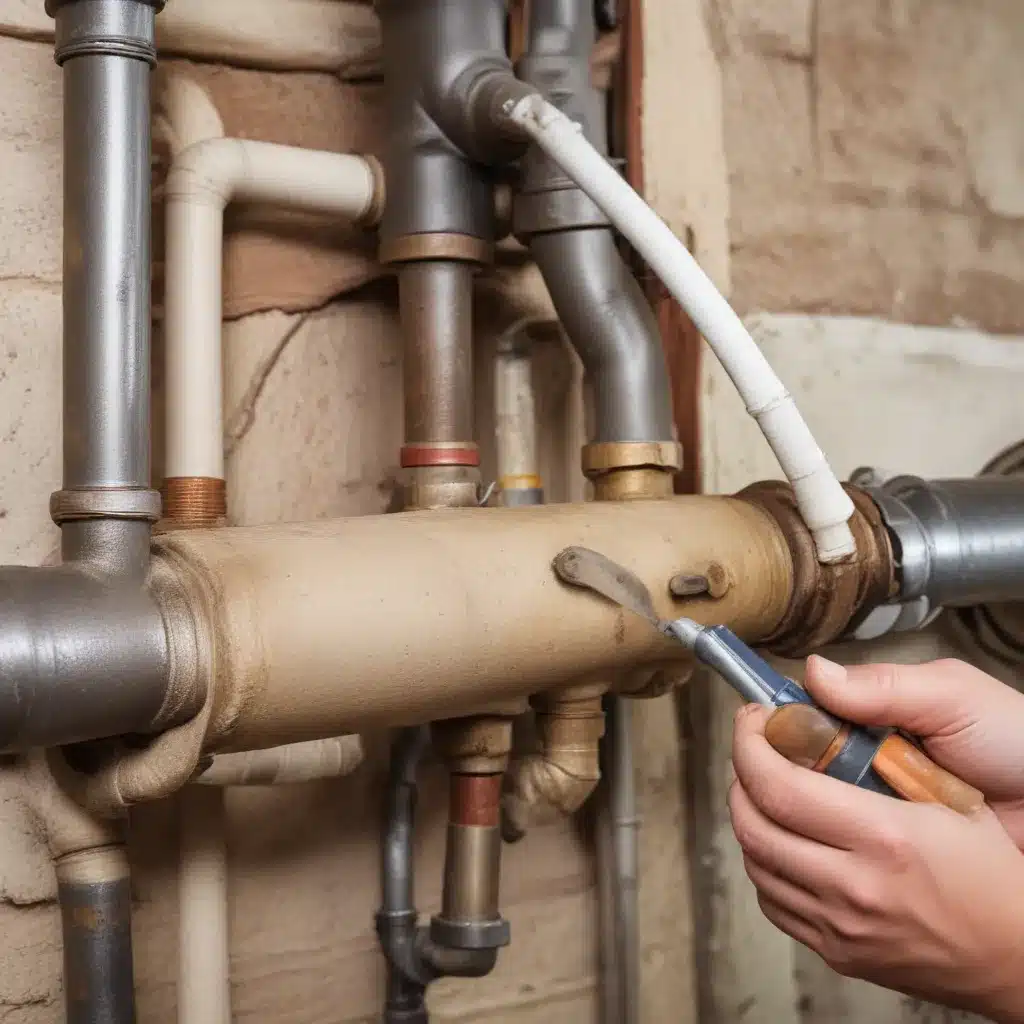
As a seasoned plumbing and heating expert, I’ve encountered my fair share of strange noises coming from residential plumbing systems. These mysterious sounds can be both perplexing and concerning for homeowners, often leaving them unsure of the root cause and the best way to address it. In this comprehensive guide, I’ll walk you through the process of identifying and resolving various plumbing noises, providing practical tips and insights to help you maintain your home’s comfort and efficiency.
Diagnosing the Source of the Noise
The first step in solving a plumbing noise mystery is to accurately pinpoint the origin of the sound. This can be a bit tricky, as plumbing noises can often be deceiving, seemingly coming from one location when the actual source is somewhere else. Here are some strategies to help you hone in on the culprit:
Isolate the Area
Start by systematically turning on and off the water supply to different parts of your home. This will help you narrow down the affected area and determine if the noise is isolated to a specific fixture, such as a toilet, sink, or shower. Pay close attention to which rooms or zones the sound is most prominent in, as this can provide valuable clues.
Listen Closely
Once you’ve identified the general vicinity of the noise, get up close and personal. Carefully listen for the sound, noting any variations in pitch, volume, or timing as you move around the area. This close-up inspection can reveal subtle details that may help you pinpoint the source.
Eliminate Obvious Suspects
Common plumbing noise culprits include loose or worn washers, faulty valves, and clogged drains. Examine the visible components of your plumbing system, such as faucets, showerheads, and P-traps, to check for any obvious issues that could be causing the disturbance.
Enlist the Help of Technology
If you’re still struggling to identify the source, consider using technological aids to assist your investigation. Apps that convert your smartphone into a microphone or vibration sensor can help you pinpoint the exact location of the offending noise. Alternatively, a borescope camera can provide a closer look at hard-to-reach areas of your plumbing system.
Resolving Common Plumbing Noises
Once you’ve successfully identified the source of the noise, it’s time to address the underlying problem. Here are some of the most common plumbing noises and the steps you can take to fix them:
Gurgling Sounds
Gurgling noises often indicate a blockage or issue with the venting system in your plumbing. This can be caused by a clogged vent pipe, a dried-out P-trap, or a buildup of debris in the drain line. Start by using a plunger or drain snake to clear any obstructions, and consider having a professional plumber inspect your venting system if the problem persists.
Screeching or Whistling Noises
High-pitched screeching or whistling sounds typically point to a problem with water pressure or flow. This could be due to a faulty or malfunctioning pressure-reducing valve, a partially closed shut-off valve, or even mineral buildup in your plumbing pipes. Adjust any valves to ensure proper water flow, and consider having a plumber inspect your system for any underlying issues.
Banging or Hammering Noises
The dreaded “water hammer” effect, characterized by loud banging or hammering sounds, is often caused by sudden changes in water pressure or flow. This can happen when a faucet or appliance is turned off abruptly, sending a shockwave through the plumbing system. Installing water hammer arrestors, also known as shock absorbers, can help mitigate this problem.
Ticking or Clicking Sounds
Intermittent ticking or clicking noises may be the result of a loose or malfunctioning valve, a problem with your water heater, or even an issue with your home’s heating system. Carefully inspect any valves, connections, and appliances in the affected area, and consider having a professional plumber or HVAC technician take a closer look.
Rumbling or Boiling Noises
If you’re hearing a rumbling or boiling sound coming from your water heater, it’s likely due to a buildup of sediment or mineral deposits. This can reduce the efficiency of your water heater and potentially lead to more serious issues. Flushing your water heater or having it serviced by a professional can help resolve this problem.
Preventing Future Plumbing Noises
To minimize the risk of experiencing mysterious plumbing noises in the future, it’s important to maintain your home’s plumbing and heating systems regularly. This includes:
- Scheduling annual maintenance checkups with a professional plumber or HVAC technician
- Promptly addressing any leaks or water pressure issues
- Keeping your drains clear by using a plunger or drain snake on a regular basis
- Considering the installation of water hammer arrestors or other preventative measures
- Ensuring your water heater is functioning properly and flushing it as recommended
By staying proactive and addressing any potential issues as they arise, you can help safeguard your home’s plumbing and heating systems, reducing the likelihood of future mysterious noises and ensuring your family’s comfort and peace of mind.
Conclusion
Solving the mystery of plumbing noises can be a challenging but rewarding experience. By employing a systematic approach, utilizing technological tools, and understanding the common causes of these disturbances, you can effectively identify and resolve the issue at hand. Remember, addressing plumbing noises promptly is not only important for maintaining your home’s comfort, but it can also prevent more serious and costly problems down the line.
If you’re still struggling to pinpoint the source of a persistent plumbing noise, don’t hesitate to reach out to the experts at DD Plumbing and Heating. Our team of experienced professionals is dedicated to providing top-notch service and helping you maintain a healthy, comfortable home environment.


